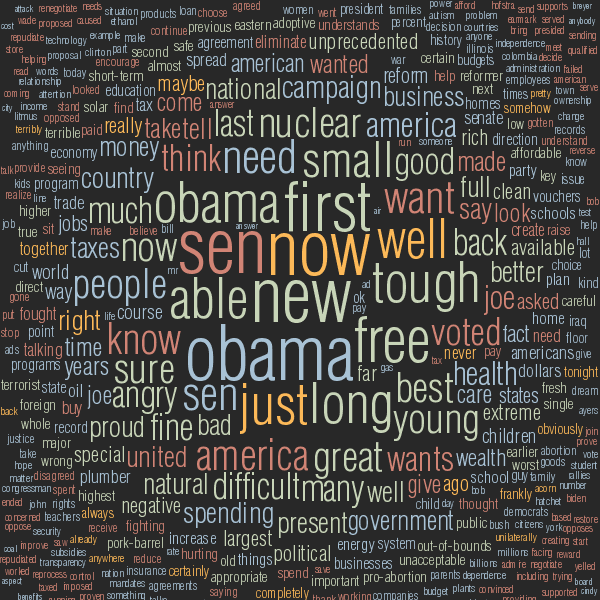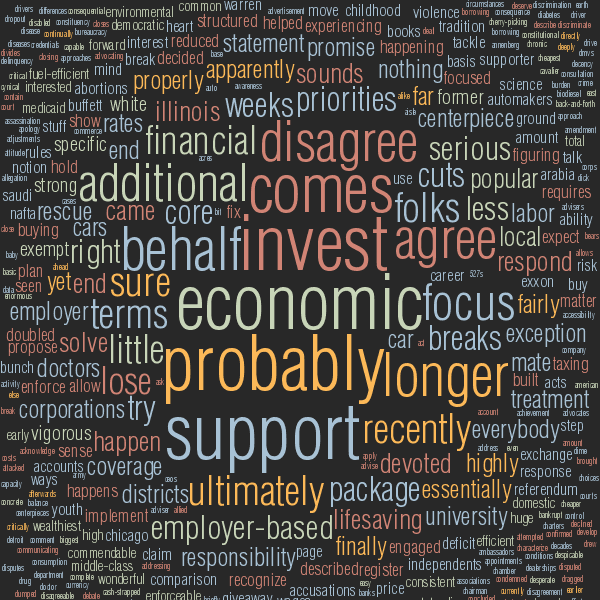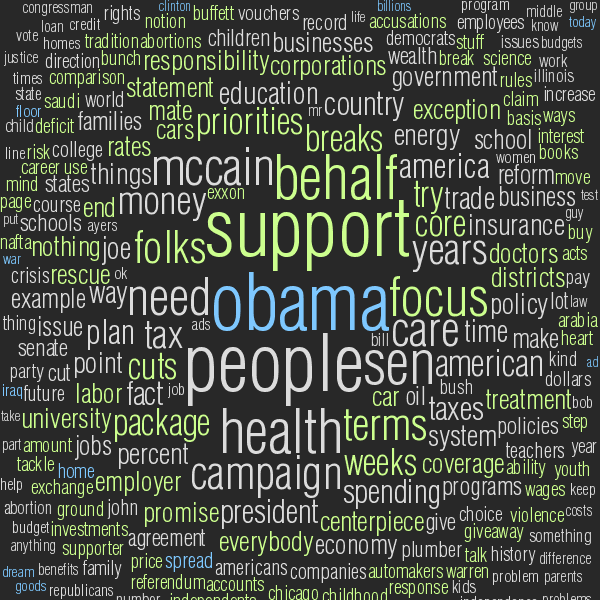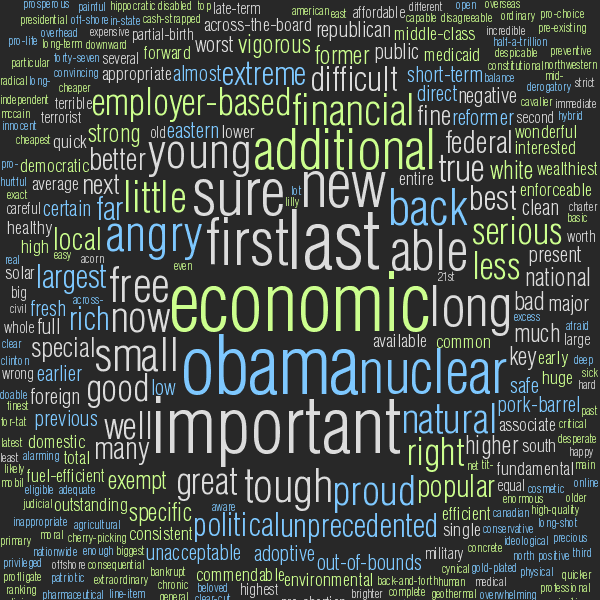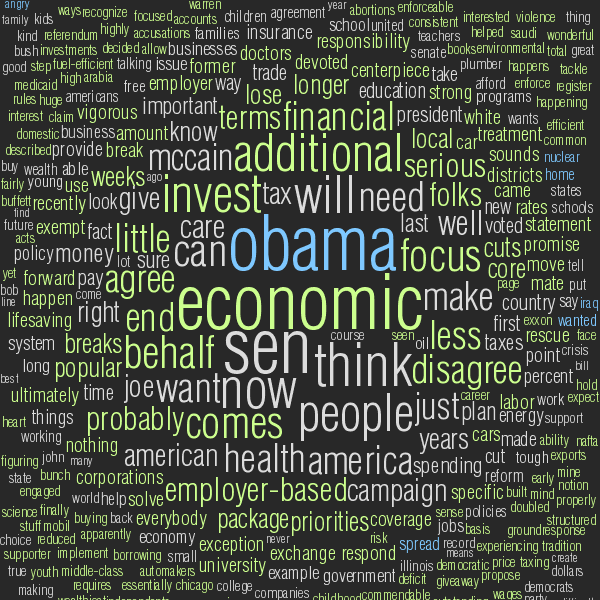Word Analysis of 2008 U.S. Presidential Debates
Barack Obama vs. John McCain (3nd debate)
15 October 2008
Word Statistics
Debate Word Count
Summary Word Count
The summary word count reports the total number of words and the
number of unique, non-stop words
used by each candidate. Word number is expressed as both absolute and relative values.
Table 1. Number of all words and unique words used by each speaker.
Table 1 Analysis
Obama continues to deliver consistently more words than McCain. Although in this debate some 300 words fewer were spoken by Obama than in the first debate, Obama said +11.3% more words than McCain. Obama' unique vocabulary size remained at 1,375, only one word less than in the first debate.
McCain's vocabulary size in this debate was only 1,295, a change of -6.2% from the first debate. Note that although fewer words were said, Obama delivered just as many unique words in this debate as the first one, suggesting that McCain's drop was not necessarily due less allotted time.
Table 1 Legend
Stop Word Contribution
In the table below, the candidates' delivery is partitioned into stop and non-stop words. Stop words are frequently-used bridging words (e.g. pronouns and conjunctions) and do not carry inherent meaning. The fraction of words that are stop words is one measure of the complexity of speech.
Table 2. Expanded analysis of total, stop and non-stop word count.
Table 2 Analysis
Non-stop word fraction in this debate was slightly lower than in the first debate, by about 2% for both candidates.
Table 2 Legend
All further analysis uses debate content that has been filtered for stop words.
Word frequency
The word frequency table summarizes the frequency with which words were used. Specifically, the average word frequency and the weighted cumulative frequencies at 50 and 90 percentile. The average word frequency indicates how many times, on average, a word is used. For a given fraction of the entire delivery, the weighted cumulative frequency indicates the largest word frequency within this fraction (details about weighted cumulative distribution).
Table 3. Average, 50%, and 90% weighted cumulative word frequencies (content filtered for stop words).
Table 3 Analysis
Average frequency remains very similar for both candidates, here at 2.67 for Obama and 2.591 for Mccain, compared to 2.63 and 2.51 during the first debate.
Table 3 Legend
Sentence Size
Table 4. Number of words in a sentence, as measured by average number of words, 50% and 90% weighted cumulative values for three word groups (all words, stop words and non-stop words).
Table 4 Analysis
Sentences of both candidates were shorter, by about 0.6 words for Obama and 2.8 for McCain. Once stop words were removed, the non-stop length sentence length for Obama was the same as the first debate, but nearly a whole word shorter for Mccain (6.2 vs 7.1). Here McCain was obviously either being cut short, simplifying his delivery or flustered.
Table 4 Legend
Part of Speech Analysis
In this section, word frequency is broken down by their part of speech (POS). The four POS groups examined are nouns, verbs, adjectives and adverbs. Conjunctions and prepositions are not considered. The first category (n+v+adj+adv) is composed of all four POS groups.
Part of Speech Count
Table 5. Count of words (total and unique) categorized by part of speech (POS).
Table 5 Analysis
There is no significant change for part of speech components from the first debate. Obama dropped noun use by just 2%, while McCain added 2% to his nouns. All other part of speech differences were smaller than a percent.
Unique part of speech component was quite different for verbs. Obama's unique fraction for verbs was 46%, up from 41.7% during the first debate. McCain on the other hand has 42.4% of his verbs unique, compared to 45.5% for the first debate. That's a significant difference and suggests more partial and less complex sentences.
Table 5 Legend
Part of Speech Frequency
Table 5. Frequency of words by part of speech (POS).
Table 5 Analysis
Part of speech frequency increased for both candidates. Certainly McCain' frequencies were quite a bit higher across the board from the first debate (nouns +1.2%, verbs +6.3%, adverbs +24.7%, except for adjectives which reduced in frequency by -4.1%. Obama, on the other hand, had a more modest increase (nouns -0.8%, verbs +7.6%, adjectives +3.6% and adverbs -3.1%.
We're seeing a greater increase in frequency for McCain. This, coupled with significantly fewer unique words delivered suggests a poor for this debate performance.
Table 5 Legend
Part of Speech Pairing
Through word pairing, I attempt to capture the contextual use of parts of speech within a sentence and extract concepts from the text. Specifically, unique pairs of words indicate complexity and inter-relatedness between concepts in a sentence.
Table 6a (Barack Obama). Word pairs (total and unique) categorized by part of speech (POS) for Barack Obama.
Table 6b (John McCain). Word pairs (total and unique) categorized by part of speech (POS) for John McCain.
Table 6c (Barack Obama vs John McCain). Word Pairs (total and unique) categorized by part of speech (POS) for both candidates.
Table 6 Analysis
McCain's word pairings were substantially lower than Obama's. He delivered only about half of the adjective/verb, adjective/adjective, adverb/verb, adverb/adjective pairs. His adverb/adverb pairings were only 30% that of Obama. To some degree this is expected because McCain consistently delivers shorter sentences and fewer words. However, during this debate the pairing difference is substantially greater between the candidates thatn during the first debate.
The only paring which remained relatively the same was the noun/noun pairing. All others dropped by about 10% (and many by significantly more, like adverb/adverb from 58.3% of Obama in the first debate to 30.0%).
McCain's speech in this debate is clearly lacking variety and complexity.
Table 6a,b Legend
Table 6c Legend
Word usage
This section enumerates words that were unique to a canddiate
(e.g. used by one candidate but not the other). For a given part of
speech, the table breaks down the number of words that were spoken by
only one of the candidates or both candidates (intersection). The last
row includes all words (union).
Table 7. Total and unique words used exclusively by a candidate or by both candidates.
Table 7 Analysis
Obama shatters McCain in the number of unique exclusive verbs, adjectives and adverbs. Given that we have been seeing very small differences up to now, these differences are huge. Obama delivered 224 exclusive verbs (i.e. only spoken by him), compared to McCain at 185. In the first debate he edged McCain with 127 more unique exclusive adjectives compared to 106, but in this debate the gap widens with 130 vs 95. For adverbs, McCain is a disaster this time around with only 19 unique exclusive adverbs compared to 35 in the first debate.
What is greatly telling are the contributions of unique parts of speech by each candidate to the overall debate. In the first debate, the values were relatively close for nouns and verbs, with Obama contributing to 6% more adjectives and adverbs than McCain. In this debate, Obama's contribution for verbs, adjectives and adverbs is about 7%, 11% and 24%, respectively! That last number is spectacular — in this debate Obama individually contributed to over half of the adverbs spoken in the debate.
Table 7c Legend
Noun Phrase Usage
Noun phrases were extracted from the text and analyzed for frequency, word count, unique word count and richness.
Top-level noun phrases are those without a parent noun phrase (a parent phrase is one that a similar, longer phrase). Derived noun phrases are those with a parent (more details about noun phrase analysis).
The top-level noun phrases can be interpreted as independent concepts. Derived noun phrases can be interpreted as variants on concepts embodied by the top-level phrases.
Noun Phrase Count
This table reports the absolute number of noun phrases, which is related to the number of total words (specifically, nouns) delivered. The next table presents the number of phrases relative to the number of nouns.
Table 8. Number of noun phrases.
Table 8 Analysis
The gap between Obama and McCain for unique top-level noun phrases nearly doubled in this debate. The derived noun phrase use was similar. McCain was clearly not in his best form.
Table 8c Legend
Noun Phrase Richness
The previous table presented the total number of noun phrases, which can be equated to individual concepts. In this table, this value is shown relative to the number of nouns used. The interpretation of this ratio is that of richness. In other words, how many noun phrases were constructed, per noun.
Table 9. Number of noun phrases relative to the number of nouns.
Table 9 Analysis
Number of noun phrases relative to the number of nouns remains relatively constant.
Table 9c Legend
Noun Phrase Frequency and Size
Table 10. Noun phrase frequency, word count and unique word count.
Table 10 Analysis
Noun phrase frequency and size remains relatively constant.
Table 10c Legend
Windbag Index
The Windbag Index is a compound measure that characterizes the complexity of speech. A low index is indicative of succinct speech with low degree of repetition and large number of independent concepts.
Table 11. Windbag Index for each speaker. The higher the value, the greater the degree of repetition in the speech.
Table 11 Analysis
McCain's performance in the third debate was much worse than the first two debates. His WI this time around was 505, which should be compared to values of 368 and 352 for his other debates. Obama's index was higher in this debate as well, but not significantly.
Like before, McCain has better uniqueness statistics for word usage, but does much worse for adverbs and unique noun phrases. In particular, t9 for McCain is 9% lower than Obama (in the first debate it was 7.5% lower).
Table 11c Legend
Tag Clouds
In the tag clouds below, the size of the word is proportional to
the number of times it was used by a candidate (tag cloud details).
Not all words from a group used to draw the cloud fit in the
image. Specifically, less frequently used words for large word groups
fall outside the image.
Debate Tag Clouds for Each Candidate — All Words
Each candidate's debate portion was extracted and frequencies were
compiled for each part of speech (noun, verb, adjective, adverb), with
words colored by their part of speech category. The words in these
tag clouds include words unique to one candidate as well as words used by
both candidates. For other tag clouds below, only words unique to a
candidate are used.
Keep in mind that the word sizes between tag clouds cannot be
directly compared, since the minimum and maximum size of the words in
each tag cloud is the same. However, the distribution of sizes within
a tag cloud reflects the frequency distribution of words (tag cloud details).
Debate Tag Cloud for Barack Obama — all words
Debate Tag Cloud for John McCain — all words
Debate Tag Cloud Analysis
Obama continues to focus on "important" and uses "now" a great deal. "Nuclear" is no longer on the menu, and is replaced by "people", and "health". Obama's cloud has a significant noun component.
McCain has a lot fewer nouns than Obama in the center of his cloud. He still doesn't say "Barack", but says "tough", "difficult" and continues on "nuclear". It is interesting to see the large fraction of adjectives in McCain's tag cloud (i.e. frequently used). Although adjectives appear prominently in McCain cloud, he actually contributed fewer unique adjectives to the debate.
Debate Tag Clouds for Each Candidate — Unique Words
The tag clouds below show only used exlusively by a candidate. For
example, if candidate A used the word "invest" (any number of times),
but the other candidate B did not, then the word will appear in the
unique word tag cloud for candidate A.
Debate Tag Cloud for Barack Obama — words unique to Barack Obama
Debate Tag Cloud for John McCain — words unique to John McCain
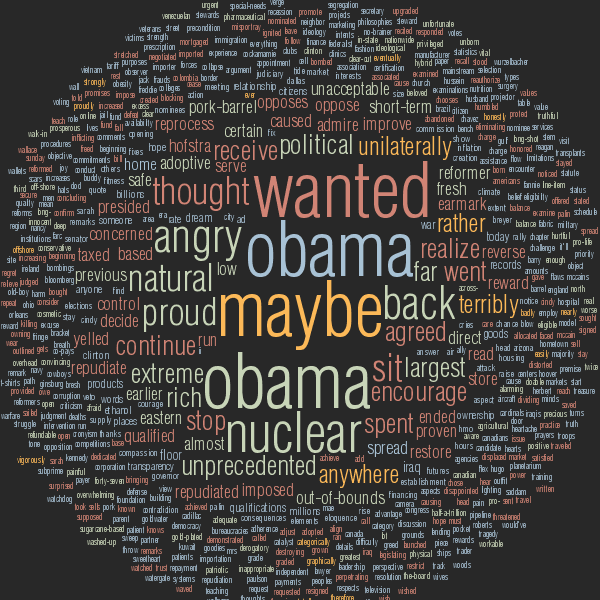

Unique Word Tag Cloud Analysis
Unique words to Obama in this debate suggest he continues to approach subjects with greater respect for complexity and inter-relationships. He uses "probably", for example, which McCain does not say. Words like "apparently", "priorities", "additional", "terms", "recently" all suggest that Obama is more comfortable with nuance and multivariate topics.
McCain' unique tag cloud actually nearly fits into the image! As mentioned above, McCain did not contribute as many unique words to this debate as past debates. The words he used were "nuclear" (which Obama did not use, perhaps with the feeling that people have had enough fearmongering and wish to hear explanations of domestic policy plans), "extreme", "unprecedented", "terribly" and "unilaterally". These are unwavering superlatives.
It is clear from these two tag clouds that Obama's delivery in this debate was richer and that he overwhelmed McCain' contribute with a greater range of topics.
Part of Speech Tag Clouds
In these tag clouds, words by both candidates were categorized on the
basis of exclusivity to a candidate. Words unique to each candidate
are drawn with a different color. Words used by both candidates are
shown in grey.
The size of the word is relative to the frequency for the candidate
— word sizes between candidates should not be used to indicate
difference in absolute frequency.
Words were further cateogorized by part of speech (noun, verb,
adjective, adverb) and individual tag clouds were prepared for each
category.
The last tag cloud in this section, which uses all (noun + verb +
adjective + adverb) parts of speech.
Tag Cloud of noun words, by speaker
Noun Tag Cloud Analysis
Do you see many blue words? Those are nouns exclusive to McCain and there is is hardly a blue word in sight. It is shocking how overwhelming Obama's delivery drowns out McCain's contribution in the realm of nouns.
Tag Cloud of verb words, by speaker
Verb Tag Cloud Analysis
For verbs, McCain's contribution also lagged behind Obama's, whose use of "agree" and "disagree" suggest a conciliatory and balanced stance.
Tag Cloud of adjective words, by speaker
Adjective Tag Cloud Analysis
McCain's top contributions, other than the regular "Obama", were "nuclear" and "angry". To the end, "nuclear" continues to be a favourite of McCain, and entirely dropped in this debate by Obama, who, on the other hand, stands out with "economic" (I cannot believe McCain did not use this word), "additional", and "financial".
Tag Cloud of adverb words, by speaker
Adverb Tag Cloud Analysis
McCain completely loses the fight for adverbs and his unique contributions only pepper a sea of words used exclusively by Obama.
Tag Cloud of all words, by speaker
All Tag Cloud Analysis
When all parts of speech are compared, the verbal victor of the night is easy to call. Obama spoke with more extensive use of a greater number of concepts, drowning out McCain nearly entirely. You can see, for example, that although McCain uses "nuclear" exclusively, and this is one of his favourite words, when relative frequency is compared to words spoken by Obama (i.e. relative to frequencies by the same speaker), "nuclear" is drowned out by Obama's terms. This means that as much as McCain repeated "nuclear", Obama in his delivery drove a much larger number of points across.
Word Pair Vignette Tag Clouds for Each Candidate
Tag Cloud of word pairs by Barack Obama

▲
adjective/adjective by Barack Obama
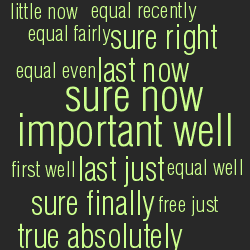
▲
adjective/adverb by Barack Obama
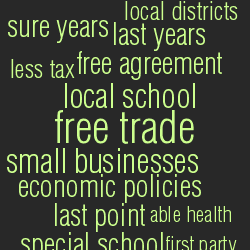
▲
adjective/noun by Barack Obama

▲
adjective/verb by Barack Obama

▲
adverb/adverb by Barack Obama

▲
adverb/noun by Barack Obama
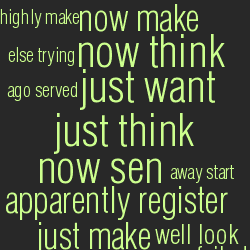
▲
adverb/verb by Barack Obama
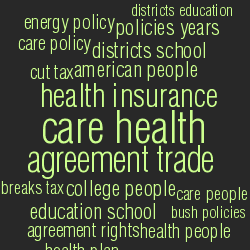
▲
noun/noun by Barack Obama
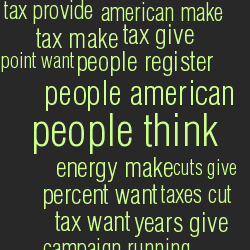
▲
noun/verb by Barack Obama
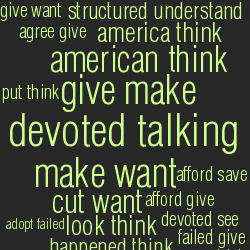
▲
verb/verb by Barack Obama
Word Pair Tag Cloud Analysis for Barack Obama.
Obama is driving his points harder than in the first debate. The word pair tag clouds are less populated and filled with larger words, suggesting more pairs with higher relative frequency. For example adjective/adjective pair tag cloud has only 8 pairs, compared to over 20 in the first debate.
Tag Cloud of word pairs by John McCain
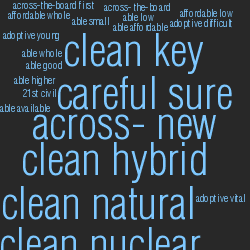
▲
adjective/adjective by John McCain

▲
adjective/adverb by John McCain
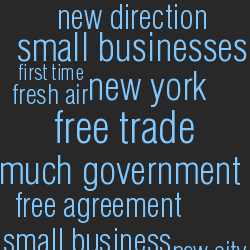
▲
adjective/noun by John McCain
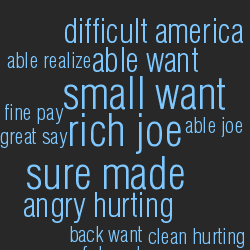
▲
adjective/verb by John McCain
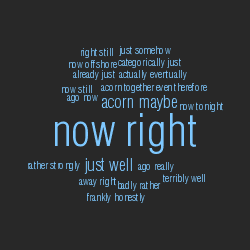
▲
adverb/adverb by John McCain

▲
adverb/noun by John McCain
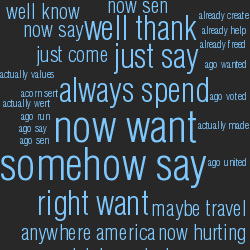
▲
adverb/verb by John McCain

▲
noun/noun by John McCain
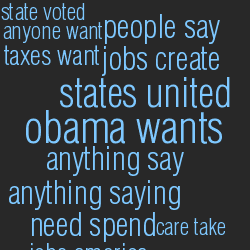
▲
noun/verb by John McCain
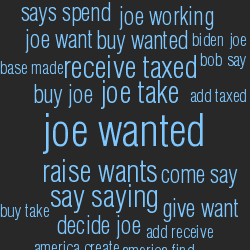
▲
verb/verb by John McCain
Word Pair Tag Cloud Analysis for John McCain.
McCain's noun/verb pairings suggests an attack stance with "obama wants", "anything say", "anything saying". In fact, by having "obama" as a word in his primary noun/verb pairings, McCain is seen to be talking more about what his opponent is doing than what he would himself do.
Contrast this to Obama, who does not have "McCain" or "John" in his top noun/verb pairs, chosing instead to talk about "people think" and "tax give" and "energy make".
Downloads
debate transcript (courtesy of CNN).
parsed word lists (analyzed transcript, including words by speaker, by POS, and all POS pairings).
tag cloud images
data structure
Please see the methods section for details about these files.


